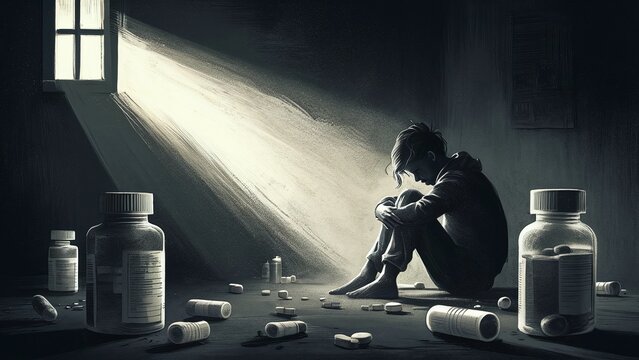The Growing Menace of Drug Abuse: A Threat to Society
By: Javid Amin
A Society in Peril
Drug abuse has emerged as one of the most pressing social concerns in the modern world. It is not just an individual problem but a crisis that threatens the very fabric of our society. The rising number of drug addiction cases, particularly among the youth, has raised alarms across various sectors, from law enforcement to healthcare and social welfare.
Recognizing the urgency of the issue, an anti-drug awareness program was recently organized by the district administration of Srinagar in collaboration with the District Social Welfare Office at Marriage Hall, Rajbagh. The initiative was undertaken following the directions of Deputy Commissioner (DC) Srinagar, Bilal Mohiuddin Bhat and aimed at educating people about the harmful effects of drug abuse on individuals, families, and society as a whole.
The Scope of the Drug Menace in Kashmir
Alarming Statistics
Kashmir, once known for its natural beauty and rich culture, is now struggling with an unprecedented rise in drug addiction. According to recent reports:
- Thousands of youth in the valley are battling substance abuse.
- Drug-related crimes and deaths have significantly increased over the past decade.
- The easy availability of drugs, both prescription-based and illegal substances, has fueled the crisis.
Experts warn that if immediate and effective measures are not taken, the problem will escalate, causing irreparable damage to the younger generation and society at large.
The Impact of Drug Abuse: Beyond the Individual
1. The Physical and Mental Health Consequences
Drug addiction leads to severe health issues, including:
- Neurological damage: Drugs alter brain function, leading to cognitive impairments and loss of self-control.
- Heart diseases: Stimulant drugs like cocaine and methamphetamine increase the risk of heart attacks and strokes.
- Liver and kidney failure: Excessive drug use can damage these vital organs.
- Mental health disorders: Depression, anxiety, and psychosis are common among addicts.
2. The Social and Economic Toll
Drug addiction doesn’t just harm the user; it destroys families, breaks communities, and drains economic resources. The financial burden of addiction includes:
- Loss of productivity in the workforce.
- Increased healthcare costs.
- Rising crime rates due to drug-related offenses.
- Families struggling with emotional and financial distress.
3. The Legal and Criminal Aspects
The illegal drug trade has led to a rise in organized crime, smuggling, and gang violence. Law enforcement agencies are battling an uphill task to curb drug peddling, but the demand for substances keeps increasing. Drug-related arrests and cases have surged, further highlighting the need for community involvement in eradicating this menace.
The Role of Awareness Programs
The anti-drug awareness program in Srinagar focused on the following key areas:
- Raising public awareness: Educating individuals on the effects of drug abuse.
- Encouraging community participation: Urging people to report illegal drug activities.
- Providing rehabilitation options: Spreading awareness about detox and rehab centers.
- Strengthening youth resilience: Engaging young people in constructive activities like sports, education, and employment.
Speakers at the event emphasized that drug addiction is not just a personal weakness but a serious medical condition that requires professional intervention. Participants took a pledge to stay away from drugs and contribute towards making Srinagar a drug-free district.
Common Issues and Social Concerns
1. Lack of Awareness
Many people, especially young individuals, start using drugs without understanding the long-term consequences. Peer pressure, curiosity, and misinformation are major contributing factors.
2. Family Breakdown and Emotional Distress
Families of drug addicts suffer immense emotional trauma. Relationships are strained, and trust is lost. Many families face financial hardships due to the addict’s inability to hold a stable job.
3. Stigma and Social Isolation
Society often ostracizes individuals battling addiction, making it harder for them to seek help. This stigma prevents addicts from getting the necessary treatment and support.
4. The Influence of Social Media and Entertainment
Movies, music, and social media often glorify drug use, making it seem fashionable or rebellious. The younger generation is particularly vulnerable to these misleading portrayals.
5. Weak Law Enforcement
Despite strict laws against drug trafficking, loopholes in the system allow peddlers to operate freely. Corruption and lack of resources further weaken enforcement.
Solutions: How Can We Combat Drug Abuse?
1. Strengthening Family Support
- Parents must maintain open communication with their children.
- Schools should incorporate drug education programs.
- Families must provide emotional and psychological support to those battling addiction.
2. Strengthening Law Enforcement
- Strict crackdowns on drug peddlers.
- Surveillance and monitoring of hotspots where drug activities occur.
- Fast-tracking legal cases against drug traffickers.
3. Increasing Public Awareness
- Regular community outreach programs.
- Use of digital platforms for spreading awareness.
- Workshops in schools and colleges to educate young minds.
4. Making Rehabilitation More Accessible
- Setting up more affordable and accessible rehab centers.
- Encouraging support groups for addicts and their families.
- Providing psychological counseling and therapy.
Bottom-Line: The Time to Act is Now
Drug abuse is a growing epidemic that needs immediate attention and action. It is not just a law enforcement issue but a social responsibility. The Srinagar administration’s initiative is a step in the right direction, but continuous efforts are needed to eradicate this menace. Communities, families, law enforcement, and educational institutions must work together to prevent the further spread of drug addiction.
With collective action and determination, we can create a drug-free Kashmir and ensure a safer, healthier future for the coming generations.


